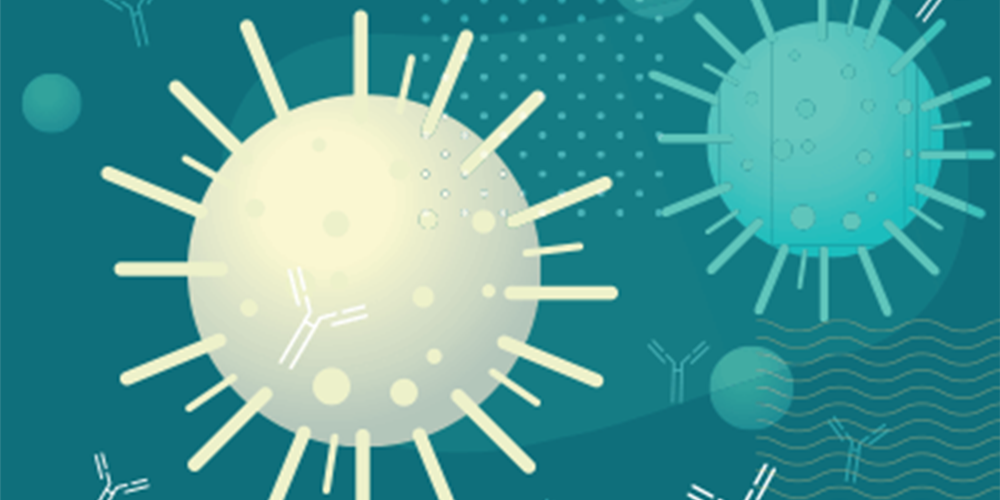Serology tests in COVID-19 research and vaccine development (Part I)

Serology tests that detect antibodies to SARS-CoV-2 in human serum are critical to gaining insight into immune responses, measuring the impact of the virus on public health, and to support the development of effective vaccines and therapeutics. This article series takes a brief snapshot of the highly dynamic situation regarding the needs for COVID-19 serology assays, how they are constructed, how they should perform, and how data can be efficiently generated using small amounts of reagents. We start with an overview.
COVID-19 sparks a paradigm shift in handling infectious disease
The genome of SARS-CoV-2 was published on January 11, 2020. Since then, the COVID-19 pandemic has sparked a massive-level pharma and biotech R&D effort fueled by translational biomedical research that breaks all records. Intensive efforts are being put forth to gain insight into the pathology, diagnostics, and treatment together with the possibility of developing pre-immunity with vaccines. A summary provided by the World Health Organization, updated March 5, 2021 indicated that 79 vaccines were in clinical development, 182 in pre-clinical development, and 4 had already reached Phase 4 (1). This level of productivity has only been possible with bioanalytical tools that can deliver reliable data quickly. We will be looking at just one aspect of this, the value of immunoassays in general to guide the R&D of vaccines, and more specifically the use of serology tests based on immunoassays.
Immunoassays deliver critical data to vaccine R&D
Vaccine R&D involves a wide range of assays, and we have already looked at how immunoassays can be used in vaccine development in some detail in earlier blog articles (High-performance immunoassays that boost vaccine development and production, Part 1. Vaccine discovery and development, and Part 2. Vaccine bioprocess development and production).
Immunoassays are widely used in vaccine development to characterize vaccine titer, purity, affinity, and potency, as well as their immunogenic response in both animals and humans.
Determining immunogenicity can involve assays based on gene expression or other cell-based assays such as the in vitro plaque reduction neutralization test (PRNT) to measure the level of neutralizing antibodies that would prevent future infection. T-cell response is commonly determined by the enzyme-linked immunosorbent spot (ELISpot) assay, for example the IFN-γ ELISpot assay has been used extensively for the screening of immune responses in the development of vaccines for the prevention and treatment of many kinds of diseases including AIDS, malaria and tuberculosis.
The value of serology tests in COVID-19
The detection of antibodies to SARS-CoV-2 in human serum with serology assays that reveal the presence of IgM and IgG antibodies is necessary to understanding SARS-CoV-2 immune responses, measuring the impact of the virus on public health, and for developing effective vaccines and therapeutics.
The pandemic has resulted in the rapid development of a range of serology tests that may measure IgG alone, IgG together with IgM, or total antibody levels. While serology assays can measure the levels of IgM and IgG antibodies, determining the level of neutralizing antibodies generally requires specific functional assays. There have been reports, however, of a correlation between titers from ELISA and titers assessed through neutralization tests (2).
No single serology test is expected to provide all the data required to fully understand the current pandemic (3), and the need for reliable serology data stimulated, for example, a virtual workshop entitled COVID-19 Serology Studies that led to recommendations for advancing serology assays and conducting serology field studies (4).
In the next article in this series, we will look at serology tests for antibodies raised against SARS-CoV-2 in more detail.
Learn more by downloading the White Paper: One-hour, microfluidic SARS-CoV-2 antibody immunoassay using Sino Biological reagents and Gyrolab® immunoassay platform.
References:
- Draft landscape and tracker of COVID-19 candidate vaccines. World Health Organization. 5 March, 2021.
- Amanat, F. et al. A serological assay to detect SARS-CoV-2 seroconversion in humans. Nat Med 26, 1033–1036 (2020).
- Antibody testing for coronavirus disease 2019: not ready for prime time. Duong YT et al. BMJ 2020;370:m2655
- The COVID-19 Serology Studies Workshop: Recommendations and Challenges. Lerner, AM et al. Immunity 53, July 14, 2020